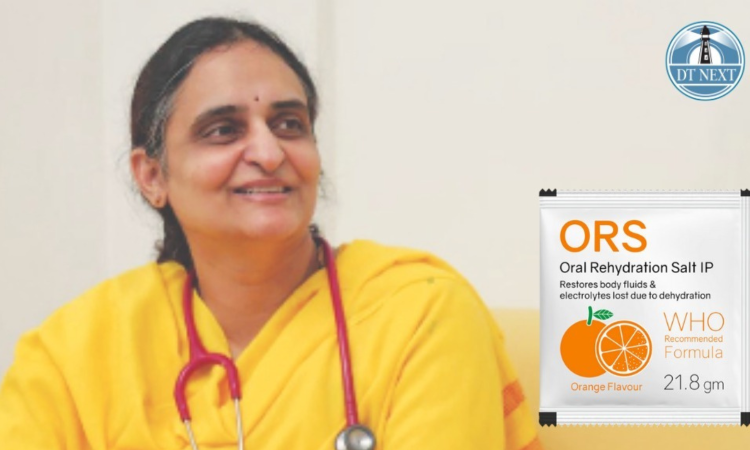After 8 years of fighting sugary ORS, Dr Sivaranjani Santosh says, ‘I wanted to give up, but I won’t’
Dr Sivaranjani Santosh, a Hyderabad-based paediatrician, won an 8-year battle and an FSSAI order to get sugary ‘ORS’ off the racks. And the battle is far from over, she says, and asserts..

Dr Sivaranjani Santosh
CHENNAI: Eight years ago, Hyderabad-based paediatrician Dr Sivaranjani Santosh noticed that many children with diarrhoea were not recovering, even though she had prescribed Oral Rehydration Solution (ORS).
When she probed further, she realised that parents were being handed sugary ‘ORS variants’ instead of the WHO-recommended formula—drinks that were making the children sicker.
“When I realised that these children were being given drinks 10 times more sugar than the WHO-recommended ORS formula, I was shocked,” she says.
As per the WHO formula, an ideal ORS should have 13.5 grams of glucose (anhydrous), 2.6 grams of sodium chloride and 1.5 grams of potassium chloride in one litre of water. However, the variants sold across pharmacies often have a much higher percentage of glucose, which, instead of rehydrating children, further dehydrates them, leading to deterioration in their health.
That discovery marked the beginning of Dr Sivaranjani’s long battle against misleading ORS products. After years of letters, complaints and petitions to health regulators, her persistence finally prompted action. On October 14 this year, the Food Safety and Standards Authority of India (FSSAI) ordered all companies to remove the term ‘ORS’ from food and beverage products.
When she began her complaints, only ORSL existed, then owned by Johnson & Johnson and later taken over by its spinoff Kenvue. Now pharmacies and shops are filled with multiple such variants, including Rebalanz ORS and Glucon-D ACTIVORS.
In 2021, Dr Sivaranjani wrote to the Central Drugs Standard Control Organisation (CDSCO) raising an alarm about the tetra packs being sold under the name of ORSL. She also provided the organisation with samples she had collected. The CDSCO responded that the liquids were sold under FSSAI’s permission, as they were categorised as beverages.
She then wrote to FSSAI, pointing out that while these liquids were permitted as beverages, the name was misleading and that they were sold widely, including in hospitals, clinics, pharmacies, and schools. “When people approach to buy ORS, they are being handed these drinks with high sugar content,” she wrote.
In September 2022, Dr Sivaranjani filed a Public Interest Litigation (PIL) in the Telangana High Court, naming the following as respondents: Union Government of India, Ministry of Health and Family Welfare, FSSAI, CDSCO, Telangana Government, Johnson & Johnson, and other companies involved in manufacturing such drinks. The case is still pending before the Telangana High Court.
In early 2025, she wrote to the Health Ministry and the Prime Minister’s Office with more accumulated evidence, including reports, letters from mothers, ORSL labels and other tetra packs. She also submitted videos showing that when customers asked for ORS, they were handed ORSL. Her continuous efforts and letters to FSSAI were what led to the order issued on October 14.
The FSSAI order prohibited the use of the term ‘ORS’ from all food products, both as a standalone term, with any prefix or suffix, or as part of a trademark. This followed an earlier order dated July 14, 2022, which had allowed businesses to use the term ‘ORS’ provided they included a disclaimer that it was not the WHO-recommended drink.
Despite the doctor’s efforts and the new directive, these products still occupy pharmacy shelves and are often sold instead of the original ORS.
Following the October 14 order, JNTL Consumer Health (India), whose parent organisation is Kenvue, approached the Delhi High Court on October 17 seeking permission to submit a representation to FSSAI, which the food regulatory body agreed to. The case is no more sub-judice.
Dr Sivaranjani says the ball now lies in FSSAI’s court to implement its own order. “If JNTL has already submitted its representation, I hope FSSAI decides in favour of the people of this country and enforces the October 14 order. I have already sent my objection via email to FSSAI and the Health Ministry, and I followed it up with a reminder on October 26. If JNTL has not submitted their representation, FSSAI has to anyway implement its own order by October 24,” she says.
Only stricter laws would curb the rampant sale of the sugary ORS variants, the doctor believes. “The government should bring in a law that restricts selling anything other than WHO-recommended formula ORS and water under that label in pharmacies. These companies can just change their name: ORSL can go by L, or QRSL, or DRSL. The rural population is much more vulnerable, as they might not know they are being handed highly sugary drinks,” she says. “The government should also only give single-drug formulations for medicines and not multiple-drug formulations to ensure quality and safety.”
Speaking about how parents and doctors can stay cautious, she advises parents against rushing into buying supplements or medicines based on online advice or by buying over-the-counter medicines. They should follow the doctor’s advice and avoid repeating prescriptions without consultations.
“A good, balanced diet is what parents should focus on and not be misled by advertisements. Only when a paediatrician decides on a supplement for a child should it be taken, in the right form, and for the prescribed number of days,” the doctor cautions.
She also urges doctors to teach parents how to read labels, to know what to look for in them, and to be observant when certain medicines do not work on their patients.
Meanwhile, Dr Sivaranjini’s battle to stop manufacturers and retailers from selling highly sweetened drinks as ORS variants continues. “I am just an independent doctor fighting for a cause. I want the children to be safe. I am tired of fighting. For a moment, I thought I would give up, but I won’t,” she vows.



